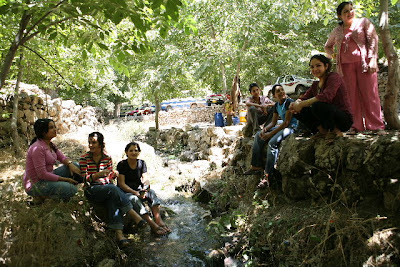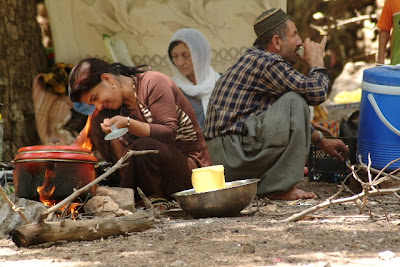
After 26 hours of not sleeping, I instantly passed out on the plane from Amman to Sulaimania. Departing at 4AM and adding an hour due to the time difference, we arrived in Sulay at approx. 6:30AM. It wasn’t a normal flight where people chitchat as they board and exchange niceties. Barely a word was spoken, neither in the waiting area of the airport or during the flight. The big southern fella in the cowboy hat I imagine was a contractor. A dashing Kurdish man, accompanied by what I imagined to be a gypsy beauty with kohl-black ringed eyes and a smile that erupted each time anyone spoke to her, had quite a problem with airport immigration. As I sailed through after a brief wait, her gentlemen friend was still arguing with the officials.
For those of you who know me, you have seen how I love too easily, and so once again I immediately fell deeply in love as I spied the mountainous Sulaimanian terrain through the plane’s window. Any trepidation or lingering melted away as I stepped off the plane and was embraced by the mountains' enormous grasp. It suddenly all came back to me why I was there…here…having wondered at the airport in Amman if I was truly crazy for returning to this place of war.
But the war is not apparent in Sulay. There are limited checkpoints, signs of enormous growth everywhere, men with scarves wrapped turban-like around their heads wearing big, flowy zoot-suit-type pants cinched at their ankles, and smooth clean black asphalt roads. How could it be I was at all tentative about coming to this place that captivated my affection so immediately, so intensely?
The place where I am staying houses an Iraqi environmental NGO that shall remain nameless for now. I have arrived in time to participate at the start of a 6-week bio diversity survey of the surrounding region. After sleeping a good part of the first day and making introductions to the 18+ members of the survey team, we went off early the next morning to the first site of the day: Biyari, a small mountain village directly on the border with Iran. The mountain's embrace tightened around me as we drove to the site: a centuries old pure water stream emanating from an underground spring. The area to be surveyed was wooded and cooler than Sulaimania. Seated on blankets under the spacious arms of the trees, families were gathered to picnic and beat the summer heat.

A healthy mixture of Kurds, and Shiite and Sunni Arabs, the environmental NGO’s survey team of biologists, chemists and geologist are representative to some degree of the brain drain that is decimating central and southern Iraq. The Shiite and Sunni are all displaced, having had to flee their places of origin; many have family scattered to Jordan, Syria, Switzerland and farther. One man has not seen his not-quite-one-year-old grandson yet. Another travels occasionally to Syria to see his family – that is, the family members who are there and not in some other “external” to Iraq location.

All quickly scattered and went about their work. Some measured water quality and fluidity. Others took to the hills to photograph plants, animals, birds, insects and other flora and fauna. I was free to mingle with the families who beckoned to me invitations to join them and to photograph them. One family up the hill had brought a sound system and Kurdish music flowed among the trees. A rock wall acting as buffer between the picnic area and stream housed colonies of hundreds of one type of butterfly. (It is almost 3AM as I write this and if everyone weren’t asleep right now I would ask what type of butterflies they were and pass the info along to you.)
[Later: I have asked and it was not a butterfly but a moth with leaf like green-veined camouflaged external wings with bright orange undersides.]

By now you are beginning to question if I am truly in Iraq! Don’t worry. So am I – questioning just where I am! It is true that at the site in Biyari we could have technically been in Iran. Wherever we were, there were no signs of war. However, as we readied to leave a few hours later, a woman preaching Islamist dogma to a large group of women and girls who surrounded her listening to rapture emanating from her mouth, was pointed out to me. It was not rapture but brainwashing, I was assured by the Kurds of the group, who openly despise the Islamists, especially this woman and her disciples who were most likely members of Ansar al Islam – a radical Islamist Kurdish Sunni offshoot group that promotes Jihad and is known for using suicide bombers to kill and maim in an ongoing war with other Kurdish groups. “Ansar al Islam was kicked out by the Peshmerga and the US,” I was informed by our extraordinarily observant and intelligent young Kurdish biologist-fixer. “They go in and out of Iran at will.”

Indeed, we passed a number of checkpoints while making our way up the mountain – some made up of Kurdish police, some of Kurdish border guards, others Peshmerga or Kurdish government forces. Women were working equally among the men. Unlike al Qaeda-denialists in the US, the Kurds acknowledge that al Qaeda is alive and well and readying to wreck havoc. In fact, the original lake-based survey site planned for the day was closed off to us by the military due to al Qaeda activity.


The second site of the day was a valley river area that also serves as a summer picnic park. When we arrived a Kurdish wedding was about to begin.

The women were wearing incredible colors – bright hues of blues, reds, golds, greens and oranges. As I passed them making my way further up the river, Kurdish music started up.

A family along the riverside called me over for tea and I joined them. Although we did not share even one word of a common verbal language, we communicated beautifully - they asked me to photograph them and then one man took my camera, and after a short bit of direction from me on its use, proceeded to take a pretty damn good group shot with me in it.


I left them to traverse further up river, carefully walking in the stone-lined riverbed, its water a cool salve to my hot and tired sandled feet. At a deeper spot, a few young boys from the wedding were shedding their clothes and diving into the water.

I watched, photographed and walked into a field adjoining the river.

Its lush green expanse was met by a cool line of mowed and dry yellowish grass that spread to the far distance meeting the base of mountains the like of which I had never seen before. Their light and transparent hued peaks, faded away by the extremely harsh summer sun, steamily rose up through an equally faded sky.
Standing in awe, realizing that for all the talk that had been going on since (and I am sure long before) my arrival, of Islam, religion, and differences between us, this place I stood within was a church of a different sort where any and all participate in any given moment – that is, if they take the time. After filling on this feast for the soul I headed back in the direction of the wedding where I was asked to dance.

Yes, really, this is a war zone.


1 comment:
Great photographs. did you take photos of dancing? Have you learned to tell Kurds from Arabs yet. Note Kurds have faces of people in peace with themselves
bajalan
Post a Comment